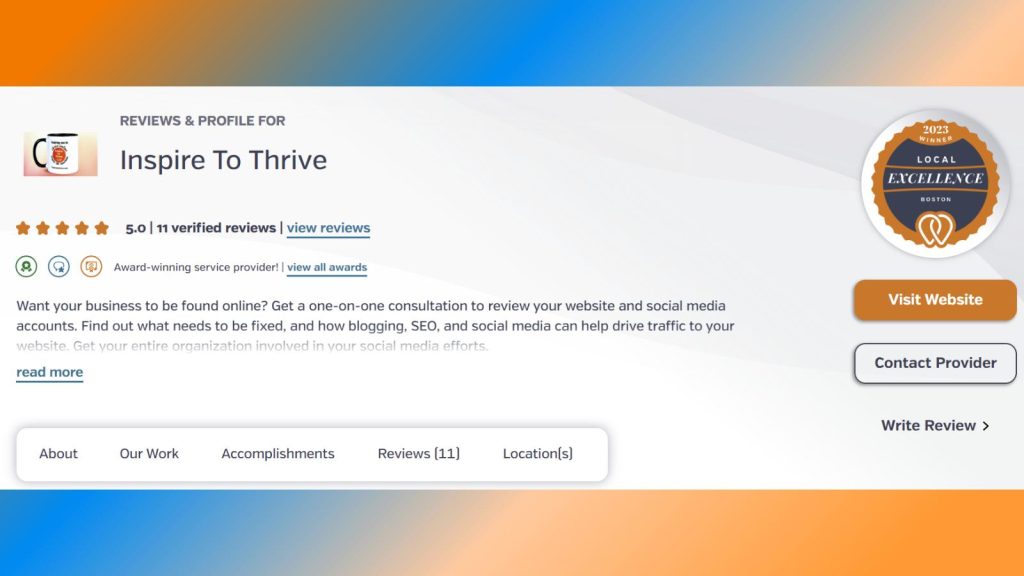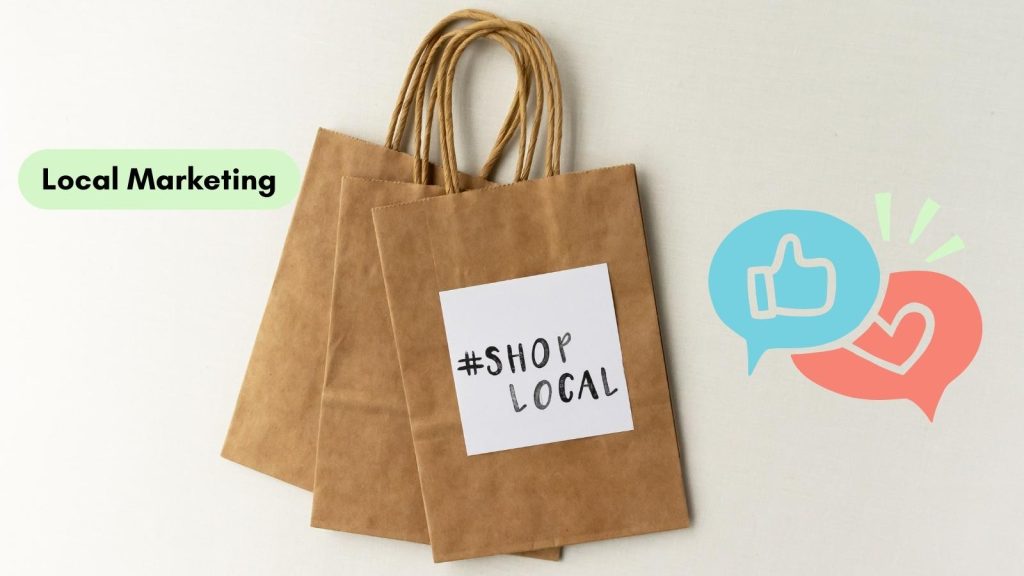The power of local marketing is undeniable when it comes to propelling small businesses toward triumph. In today’s highly competitive business landscape, leveraging effective strategies that cater to the local market can make all the difference in attracting and retaining customers.
From optimizing online presence to engaging with the community, this blog post will explore key tactics to help small businesses thrive in their local area. Discover how to maximize visibility, connect with target audiences, and drive growth through tailored local marketing pros strategies.
Table of Contents
Understanding the Importance of Marketing For Locals
First, What Is Local Marketing?
Local marketing promotes products or services to customers within a specific geographic area. It’s about reaching potential buyers near your business’ physical location. Smart geo marketing strategies target people most likely to visit your store or use your local service.
Regional marketing tactics include optimizing your website for local search, claiming online listings, soliciting customer reviews, and running location-based ads or offers.
Successful community marketing campaigns drive foot traffic, website visits, and conversions from nearby prospects in the market for what you offer.
It plays a crucial role in the success of small businesses. By leveraging the power of targeting customers within their immediate vicinity, small businesses can achieve significant growth and competitive advantage.
In this section, we will explore the impact of local marketing on small businesses and the benefits of targeting local customers.
The Impact of Local Marketing Campaigns on Small Businesses
Marketing for local businesses has a profound impact on small biz in several ways. Firstly, it allows them to establish a strong presence within their local community.
By utilizing targeted marketing efforts, small businesses can increase brand awareness and visibility among potential customers who are more likely to convert into loyal patrons.
Moreover, local sales tactics enables small businesses to compete effectively against larger, nationwide chains. By focusing on the unique selling propositions of their products or services and highlighting their local roots, small businesses can stand out in the market and differentiate themselves from their larger counterparts.
Additionally, native marketing facilitates the development of personal relationships with customers. Small businesses have the advantage of offering personalized and tailored experiences to their clientele, fostering a sense of community and trust.
These relationships often result in repeat customers and positive word-of-mouth recommendations, further enhancing the business’s reputation within the local area.
The Benefits of Targeting Local Customers
Targeting local customers offers a range of benefits that can propel the growth of small businesses. Firstly, it allows for more precise and efficient marketing strategies. By focusing on a specific geographic area, small businesses can optimize their marketing efforts and allocate their resources effectively.
This targeted approach ensures that the business is reaching the right audience with the right message at the right time.
Furthermore, targeting local customers increases the likelihood of generating qualified leads and conversions. Local customers are often more inclined to support local businesses, as they value the sense of community and the economic impact of their purchases.
By tailoring marketing campaigns to resonate with local preferences and needs, small businesses can attract customers who are more likely to engage with their brand and make a purchase.
In addition, targeting local customers allows for a higher level of personalization in marketing communications. Small businesses can create content and offers that directly address the needs and interests of their local audience.
Key Strategies for Effective Local Advertising Methods
In today’s competitive business landscape, effective local marketing methods can be the key to success for small businesses. By targeting your local audience, you can build brand awareness, drive traffic, and generate leads in your local area.
In this section, we will explore some key strategies that can help you maximize your local marketing efforts.
Optimizing Your Website for Local Searches
Optimizing your website for local searches is crucial to ensure that your business appears in relevant local search results. Here are some key steps you can take to improve your website’s visibility:
- Incorporate local keywords: Conduct keyword research to identify relevant local search terms and incorporate them into your website’s content, meta tags, headings, and URLs.
- Create location-specific landing pages: If you have multiple business locations, create dedicated landing pages for each location, providing detailed information and optimized content for each.
- Include contact information: Make sure your business name, address, and phone number (NAP) are prominently displayed on every page of your website, preferably in the footer or header.
Creating and Optimizing Your Google My Business Listing
Google My Business (GMB) is a powerful tool to enhance your local online presence. Here’s how to make the most of it:
- Claim and verify your business listing: Claim your GMB listing and go through the verification process to establish your business’s credibility.
- Provide accurate information: Ensure that all the information on your GMB listing, including your business name, address, phone number, website URL, and business hours, is accurate and up-to-date.
- Add photos and videos: Visual content can attract more potential customers. Add high-quality photos and videos that showcase your products, services, and unique features.
Leveraging Online Directories and Review Sites
Online directories and review sites play a crucial role in marketing a local business. Consider the following strategies:
- Submit your business to local directories: Identify reputable local directories and submit your business information to increase your online visibility.
- Encourage customer reviews: Positive reviews can significantly impact your reputation and attract new customers. Encourage satisfied customers to leave reviews on popular review sites such as Yelp, TripAdvisor, and Angie’s List.
- Respond to reviews: Engage with your customers by responding to their reviews, whether positive or negative. This demonstrates your commitment to customer satisfaction and can help build trust.

Implementing Local SEO Techniques
To improve your local search engine optimization (SEO), consider the following techniques:
- Build local backlinks: Seek opportunities to obtain backlinks from local websites, such as local newspapers, community organizations, and chamber of commerce websites.
- Optimize for voice search: With the rise of voice assistants, optimize your website for voice search queries by using natural language and incorporating long-tail keywords.
- Use structured data markup: Implement structured data markup on your website to provide search engines with more context about your business, such as your location, opening hours, and customer reviews.
Additionally, taking the time to hire design sprint services may help you quickly develop and test local SEO strategies. This focused, time-constrained process allows you to ideate, prototype and garner feedback on SEO plans. As well as give yourself a chance to enhance your presence in the local market.
Utilizing Social Media to Connect with Local Audiences
Social media platforms provide an excellent opportunity to engage with your local audience. Here’s how you can leverage social media effectively:
- Identify and join local groups: Search for local groups, communities, or forums on platforms like Facebook and LinkedIn. Participate in discussions, offer valuable insights, and promote your business when relevant.
- Create location-specific content: Tailor your social media content to resonate with your local audience. Share local news, events, and promotions to establish yourself as a trusted local resource.
- Run targeted local ads: Utilize social media advertising tools to target your ads specifically to users in your local area. This can help you reach your intended audience more effectively.
Hosting Local Events and Collaborating with Local Organizations
Hosting local events and collaborating with local organizations can boost your visibility and strengthen your ties with the community. Consider these strategies:
- Sponsor local events: Support local events by becoming a sponsor. This not only increases your brand exposure but also demonstrates your commitment to the local community.
- Host workshops or seminars: Share your expertise by hosting educational workshops or seminars relevant to your industry. This positions your business as a thought leader and can attract local attendees.
- Partner with local influencers: Identify local influencers or organizations that align with your brand values and collaborate on joint marketing initiatives. This can expand your reach and credibility within the local market.
By implementing these key strategies for effective marketing, your small business can thrive in your local area and gain a competitive advantage.
Remember, engaging with your local audience, optimizing your online presence, and building meaningful relationships within the community are the pillars of successful local business marketing strategies.
AI For Marketing Locally
Using AI for local marketing boosts visibility and engagement. It helps create personalized ads that resonate with nearby audiences.
Use AI analytics data to understand local preferences, then tailors content accordingly. It optimizes ad placements on popular local sites and apps.
Overall, AI streamlines hyper-targeted local campaigns that build brand loyalty and drive sales.
The Power of Marketing Locally: Strategies for Small Biz Triumph
Case Studies
Case studies offer valuable insights into real-world examples of successful marketing strategies for local businesses.
By examining the experiences of other small businesses, you can gain inspiration and learn valuable lessons that can be applied to your own marketing efforts.
In this section, we will explore three compelling case studies that highlight the power of marketing your biz.
Case Study 1: Rose’s Bakery
Rose’s Bakery, a small family-owned business in a tight-knit neighborhood in Baltimore, MD, faced the challenge of increasing foot traffic and competing with larger, more established bakeries.
They decided to focus on building a strong local presence and cultivating relationships with the community.
To achieve this, Rose’s Bakery:
- Hosted Community Events: They organized baking workshops and charity bake sales, engaging the community and fostering a sense of connection.
- Partnered with Local Influencers: By collaborating with local food bloggers and social media influencers, Rose’s Bakery gained exposure to a wider audience while building trust and credibility.
- Community Involvement: They actively supported local schools and charities, showing their commitment to the community beyond their business.
These efforts resulted in increased brand recognition, customer loyalty, and a significant boost in foot traffic.
Through their local marketing initiatives, Rose’s Bakery successfully positioned themselves as the go-to bakery in their neighborhood.
Case Study 2: Pete’s Plumbing
Pete’s Plumbing, a small plumbing company operating in a competitive market, faced the challenge of standing out among larger, more well-known competitors.
They adopted a targeted local marketing strategy to differentiate themselves and attract customers in their service area.
Pete’s Plumbing implemented the following tactics:
- Localized SEO Strategy: They optimized their website and online listings with location-specific keywords to improve their visibility in local search results.
- Online Reviews: Pete’s Plumbing actively encouraged satisfied customers to leave positive reviews on popular review platforms like Google My Business and Yelp. This helped build social proof and establish trust with potential customers.
- Referral Program: They implemented a referral program that rewarded customers for referring friends and family. This strategy not only brought in new customers but also encouraged customer loyalty.
As a result of their targeted niche marketing efforts, Pete’s Plumbing experienced a significant increase in calls and inquiries from customers within their service area.
Theredfore, they successfully positioned themselves as the trusted local plumbing experts.
Case Study 3: The Book Nook
The Book Nook, a small independent bookstore facing competition from large online retailers, wanted to emphasize the unique experience they offered to book lovers. They focused on creating a warm and inviting atmosphere and fostering a sense of community among their customers in NY.
Here’s how The Book Nook achieved this:
- In-Store Events: They hosted book signings, author readings, and book club meetings to bring book enthusiasts together and create a sense of belonging. Not only that but promoted events around their location.
- Knowledgeable Staff: The staff members at The Book Nook were avid readers and book lovers themselves. They provided personalized book recommendations and engaged customers in meaningful conversations about literature.
- Loyalty Program: The bookstore introduced a loyalty program that offered rewards and discounts to frequent customers, fostering loyalty and encouraging repeat purchases.
By prioritizing the customer experience and establishing a strong sense of community, The Book Nook flourished despite the presence of online giants.
Their success demonstrates the power of local marketing in building meaningful connections with customers and differentiating from larger competitors.
These case studies serve as powerful examples of how small businesses can leverage local marketing strategies to achieve success.
By understanding the unique needs of their target audience and actively engaging with the local community, small businesses can create a strong brand presence and thrive in their respective markets.
Conclusion
In conclusion, marketing for locals is a powerful strategy that can lead to triumph for small businesses. By focusing on targeting and engaging with the local community, businesses can build strong relationships and establish a loyal customer base.
The strategies discussed in this blog post, such as optimizing local listings, utilizing social media, and partnering with other local businesses, can greatly enhance the visibility and credibility of small businesses.
With the right approach and consistent effort, small businesses can leverage the power of marketing to achieve long-term success. So, start implementing these methods today and watch your small business thrive in the local market.
I’d love to hear you have been doing it for your small biz to grow your biz.
Grow Local Marketing: 7 Strategies For Small Business Triumph Share on X



